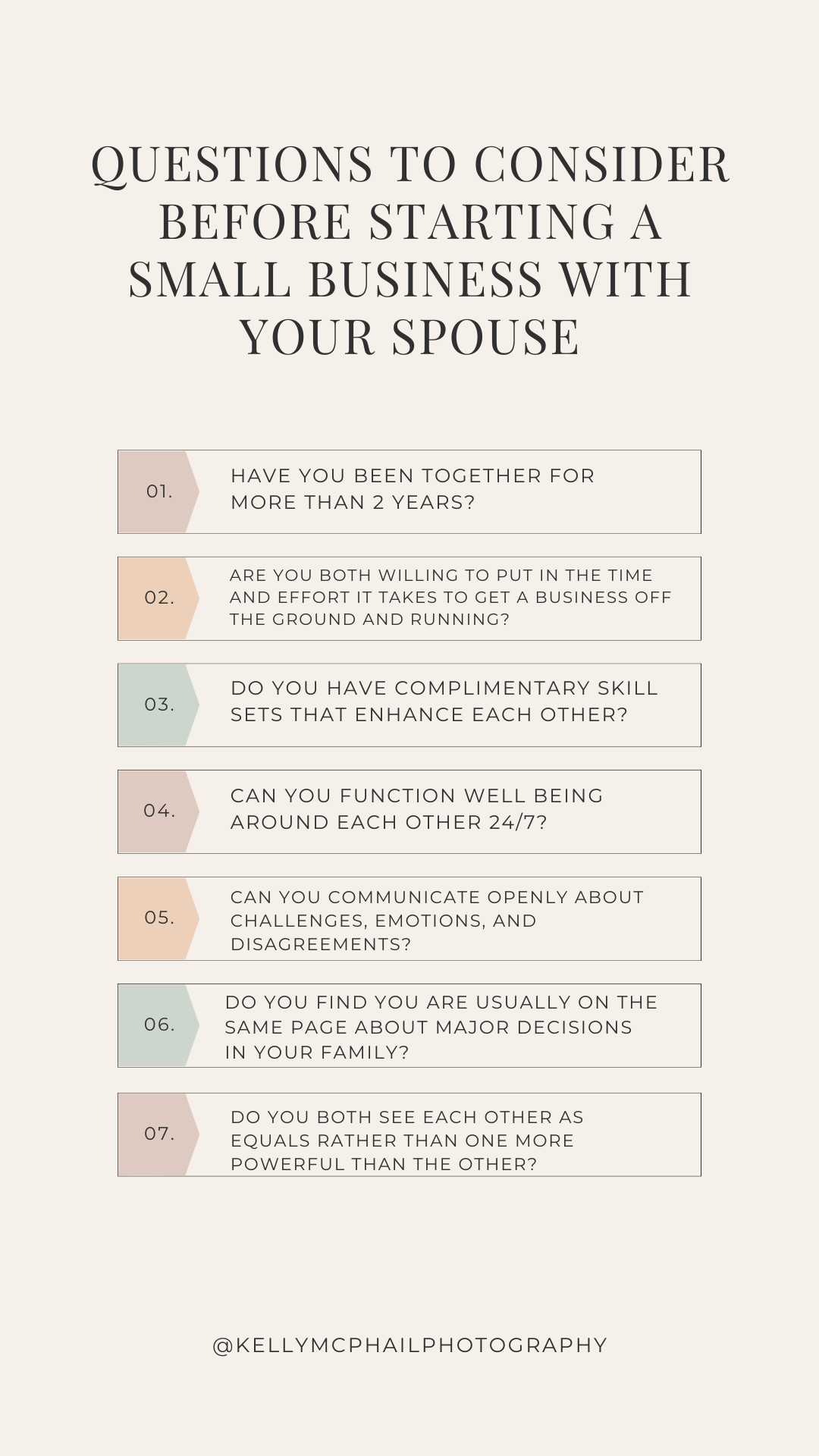
Our Story
The turning point was in the fall of 2021. Brian was in the thick of writing his PhD dissertation. I was shooting multiple family sessions a week during the peak of the fall photography season. (You people love your fall photos!) Plus, we had a 6 month old, 4yo and 6yo at home with limited childcare and no extended family within a 10-hour drive.

We were both working 60+ hour weeks, routinely staying up beyond midnight to get everything done after the kids went to bed. And, I was still getting up several times a night for nursing sessions with Cora.
Let’s be honest, we were maxed out. Our stress levels were high and we were exhausted.
In late November, Brian—the emotionally steady and even-tempered one in our marriage—was FEELING IT. (I’m sure it had nothing to do with the fact that my parents and my sister’s family had been here for Thanksgiving!) Feeling discouraged by his academic career options and burdened by the notion of our family juggling two full-time (and very demanding) careers for the foreseeable future, he reached the “moment of truth”.
(Side note: My photography business had been growing quickly, beyond what we could have imagined. And because of how difficult the academic job market is these days, we pretty regularly joked about “editing photos for Kelly” being Brian’s back-up plan.)
One night before bed, quite late, he turned to me and said, “Kelly, cast me a vision for me quitting my academic career to go into business full-time with you. What would it look like?” Honestly, it was a moment filled with excitement about the possibilities but also filled with grief (and some relief) at the realization that his academic career would be over before it started.
Fast forward 6 months and many conversations later, Brian graduated with his PhD, and then the next week, he joined me full-time to work together at Kelly McPhail Photography! After almost a year of being fully self-employed, we couldn’t be happier.
If you’re curious, keep reading. We’ll pull-back the curtain a bit on how this wife-husband team makes this work!

Yup, we get this question all the time. Surprisingly, the bulk of running a photography business is not actually time spent taking photos. There is editing, emails, marketing, client consult meetings, bookkeeping, and tons of back-end business stuff. Currently, Brian is our “director of operations”! He edits photos, is redesigning our website, handles all of the finances (bookkeeping and taxes), and is the all-around tech person. Not to mention, he cooks all of our meals, does the laundry, and gets our groceries—so he is more than pulling his weight in the home and family management department.

Let’s be honest, every couple has their moments. But all in all, we really love working together. It helps that we’d worked closely together in the past, so we knew what we were getting into. We are pretty much opposite on every aspect of every personality test you could take, and somehow that works well for us. We complement one another well, balancing one another out…kind of like yin and yang. I always feel so much more connected to Brian when we are working together rather than separate jobs. We’re on the same page, doing the same thing and it feels like the dream team when we can work together.

After hitting our monthly sales goals for about 9 months straight (and steady overall growth in the business since we launched in 2018), we were seeing a positive trend that indicated that it was already enough to support our family. And we were excited by the possibility that we could continue to grow the business further with both of us focused on it, rather than just me by myself. Brian crunched all the numbers and made a financial plan for our family. He worked through a budget, set aside emergency funds, planned for kids’ college tuition, and made sure we’d be able to set aside money for retirement.

Heeeeck yes it was! The summer after we decided, I felt this HUGE burden of being the sole financial provider for our family…of course we were doing this together, but as the one who started the business and keeps it going, it definitely was a new type of pressure I hadn’t felt before. Any big decision should always feel a little scary because that means you are not taking it lightly. You will feel all the feels but what I have learned is to walk through each and every fear and say, ok, what if that fear actually came true? What if this business totally bombed and failed? What if we had to quit and go back to 9-5 jobs? And you know what, when you walk through those what-ifs, you realize that you are going to be ok even if the worst happens and that a new door will open. Those scary feelings wore off after a few months, and we now couldn’t imagine life any other way! It is an absolute dream to be able to create your own business from the ground up and be your own boss every single day. But… be prepared to work a LOT more than you would if you had a 9-5 job! 😉

Yes and yes! Ha! The flexibility of working for ourselves has been exhilarating! We can go for a spontaneous family bike ride on a random Tuesday afternoon or take off extra time for traveling and vacations throughout the year, things that aren’t possible with many other jobs. We LOOOVE this. As the kids get older, we hope to do a lot more globe trotting!At the same time though, we don’t have a lot of extra time in our weekly routines: 1 small business + 3 small kiddos = 0 free time. Name your favorite movie or TV show. We haven’t seen it. But we spend a lot of time together with our kids and as a family, which honestly was the point of all of this in the first place. Being self-employed together affords us the opportunities to be with one another more. We don’t work 9-5. Every day has a different schedule. Sometimes, we all go get boba tea together in the middle of the afternoon. Most nights, after our kids go to bed, we both work a few more hours (often until about 11pm and often side-by-side on the living room couch).



Questions to Consider Before Starting a Small Business with Your Spouse
- Have you been together for more than 2 years?
- Do you have a similar work ethic and are both willing to put in the time and effort it takes to get a business off the ground and running?
- Do you have complimentary skill sets that enhance each other?
- Can you function well being around each other 24/7?
- Can you communicate openly about challenges, emotions, and disagreements?
- Do you find you are usually on the same page about major decisions in your family?
- Do you both see each other as equals rather than one more powerful than the other?
Could you answer yes to many of the questions above? Most successful working couples can answer yes to many of the questions above.

10 Tips for Running a Successful Small Business with Your Spouse
1. COMMUNICATION IS KEY
Your work life, family life, and married life will all be mixed-up together and communicating your ideas, expectations, feelings, disagreements are all CRUCIAL for the success of both your business and personal relationship. Do you have a good tract record of being able to work together on projects and keep communication open and amiable?
Being able to communicate expectations is essential so you can avoid unmet expectations, resentment and bitterness towards each other.

2. DO YOUR RESEARCH
Entrepreneurial types are often dreamers and visionaries who at times can lack a concrete and well-thought through business plan. Having a thorough business plan that outlines the cost of business, cost of goods, budget, operations, structure, etc. is essential in creating a good foundation for your business to thrive.
Before Brian joined our business full-time, I had been in business for 3.5 years and we had seen a positive trajectory of growth in terms of both total sales and the number of photo session bookings. Brian being the researcher and more analytical type, did all the number crunching and planning to make sure our business would successfully meet our financial goals.
3. HAVE BACKUP PLANS IN PLACE
What if the business is a complete flop? What if clients don’t book or buy your services? These were some of the questions we asked ourself before going into business full-time. It is a scary and nerve-wracking experience to put yourself out there, not knowing if it will be a success.
One thing is for sure, your business plan WILL fail if you don’t try. That’s guaranteed. But, even with our best efforts and plans, things don’t always go how we want.
We have had emergency funds in place in case things didn’t go as planned as well as the option to scale back to part-time and Brian look for another job. Thankfully, our backup plan hasn’t come into play, but it’s always good to walk yourself through the what-ifs even if it’s just for the peace of mind knowing you will be ok regardless of the outcome.
4. SECURE YOUR FAMILY FINANCES
This might seem like a no-brainer but taking a huge career risk for your family if you are already in a challenging place financially probably isn’t your best option. If you have significant student loans, credit card debt, or lack an emergency fund and would have a hard time without a paycheck coming in for a few months while you established your business, now might not be the time to make the leap.
It is said that most businesses don’t see any profit for the first 18-24 months! Yikes! Thankfully that was not the case for us, but consider having other income or part-time jobs to support your family while you get your business up and running. Maybe, it’s best to stick with your day job and start a business on the side until your income surpasses that of your day-job.
5. HIGHLIGHT YOUR DIFFERING STRENGTHS
Our guess is that you are already well aware of your spouse’s strengths and weaknesses but what does this mean for your business? Is one spouse more detail-oriented than the other or one more creative and visionary? These strengths will work together in complementary ways if you don’t focus on the differences.
Brian and I have very different skillsets. We are very aware that I am the visionary and he is much better at executing those visions. I interact with clients and shoot the photo sessions and he does editing, bookkeeping, website maintenance, and handles back-end business details. We are both very happy with our differing roles that complement one anothers’ skillsets.

6. KNOW YOUR PERSONALITY TYPES
Cue the Enneagram, Myers-Briggs, or other personality assessments that we all so love to take. Honestly though, it is so important that you have a good idea of yours and your spouse’s personality traits, and potential areas for conflict, as these could be magnified when working in a small business together.
Many times, these conflicts show up as unrealistic or unmet expectations that stem from our differing personality types and how we were raised as children. Communication styles, how we deal with tension, how we make decisions, punctuality (or the lack thereof), need for space, energy levels, are just a few areas where tension can arise.
Doing something together like the Enneagram test and discussing the results will be eye-opening for you and will help create a foundation for understanding your spouse more deeply, especially in ways that affect how you run a business together.
7. DELEGATE HOME-MANAGEMENT AND CHILDCARE RESPONSIBILITIES
They say a relationship should be 50/50 but we know this isn’t realistic. Sometimes it’s 70/30 or 90/10 on your worst days. Will you both be 50/50 with running the business or will one spouse take a more primary role while the other picks up more work around the house?
Having these conversations ahead of time will help buffer those feelings of resentment or bitterness if one spouse is “doing more” around the house than the other.
Brian and I have worked it out where I am covering about 70% of the business load, while he is at about 30%. He covers the cooking, laundry, and groceries and we both help clean and pick-up around the house. We split child-care when kids are not at school and he manages the finances while I cover the social calendar and children’s appointments and such. These delegations have changed over the years and will continue to as our kids get older but for now, we have a clear sense of who does what so it all gets done!
8. OFFER CONTINUED PRAISE AND ENCOURAGEMENT
Say kind things and say them often! We are quick to praise others we don’t know as well but somehow, those who are closest to us don’t hear it quite as much. Encourage, praise, and compliment your spouse often…it will go a long way and gratitude can help to alleviate moments of tension in a relationship and help you refocus on what is most important.
9. LISTEN DEEPLY TO EACH OTHER
It is natural when listening to someone else to think about what you want to say in reply instead of deeply and truly listening to that person. Take time to listen though… actually listen to what your spouse is saying. Are they feeling unfulfilled, tired, unseen, or frustrated?
Many communication issues are rooted in the lack of feeling understood by others. Taking time to listen and work through feelings no matter how big or small will go a long ways in cultivating a good marriage and working relationship.
10. SPEND WORK-FREE TIME TOGETHER
So, this is a hard one. When you have small children and a small business, if it’s not marked “urgent” it gets forgotten. Take time to go out on a date, snuggle up and watch a movie together (without your laptops and phones), and spend time together outside of work with your family.
It can be so hard to put down the cell-phone when clients are contacting you and people are waiting on your response, but it is vitally important that your family knows they are your first priority.
There are times that I leave my cell phone in my home-office and turn it on silent and spend the afternoon/evening with my family without its constant interruption. It is a continuous struggle but we don’t want our kids to see us constantly working and always available to others when it can interrupt our family time.

TAKEAWAYS
If you are still reading this, bravo!
The question remains, is running a small-business together right for you and your spouse right now? Are you ready to quit your full-time jobs and jump into this passion of yours with all you’ve got or maybe taking a part-time approach seems more feasible for the time being?
Only you and your spouse can answer this question but often it takes trying it first to find out.
The best part of embarking on this entrepreneurial journey though is that you are doing it with someone you love and trust! It makes it all the more meaningful and exhilarating when you unlock new opportunities, see the potential, and taste newfound freedom and flexibility while achieving the lifestyle you and your spouse want for your family!





Most crypto Investment companies such as beurex take advantage of customers ‘ funds because they feel these customers don’t know how to get their funds back, But trust me there are hidden ways you can get your lost funds back from these scammers. I was able to withdraw my 1.5BTC from Beurax, If you want to recover your money back then send an Email to them via: prompttechrecovery @ g m a i l. c o m, they’re just the best.